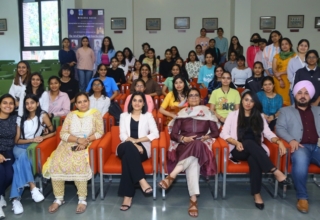
Study finds an overwhelming trend of high proportionate alarming presence of depression, anxiety, self-harm & suicide, drug abuse and tobacco consumption, sleep disorders, lack of self-confidence, and difficulty in handling inter-personal relations among college students. October 10 was the World Mental Health Day and we reproduce some of the findings
A SURVEY ON “EMOTIONAL health and Psychological well-being” conducted by psychiatrists and psychologists at Cosmos Institute of Mental Health and Behavioural Sciences (CIMBS) recently, which included over 500 college students in the age group of 18-25 years from across Delhi, shows majority of students are experiencing depressive symptoms and mood fluctuations. The study findings were released on World Mental Health Day (October 8) in New Delhi. The aim of this survey was to screen and identify common psychological health issues amongst college going students.
Alarmingly, 64.6 % of total students screened reported of experiencing depressive symptoms and mood fluctuations at present. Out of these, 44% reported of long term and recurrent disturbances in their mood. Out of all the students who reported of experiencing mood disturbances, nearly 30% were men and 70% were women.
Over 51.6% students reported of experiencing anxiety symptoms. Out of these, in 47% students, these anxiety symptoms were on-going for a chronic period of time. Out of all the students who reported of experiencing anxiety symptoms, nearly 74% were women and the rest 26% were men. 51.8% students reported of feeling overburdened by the academic pressures and uncertainties in career
“In recent times, with rapid transition in the socio-cultural scenario, an upward trend has been seen in young individuals seeking help for depression and anxiety. An individual with depression may experience sadness of mood which is out of proportion and across most situations, loss of interest in previously enjoyable activities, feeling tired easily, sleep disturbances, changes in appetite, difficulty in concentration, decreased libido, hopelessness, helplessness, excessive guilt and thoughts about ending their life. Anxiety symptoms include feeling excessive uneasiness and apprehension about future events, feeling “on the edge”, and bodily symptoms like experiencing palpitations, trembling of hands, uneasiness while breathing, unpleasant sensation in the stomach, excessive sweating, cold and clammy hands. It is important to understand when these symptoms need medical attention and seek timely help from professionals,” says Dr Sunil Mittal, Senior Psychiatrist and chairperson at CIMBS.
From all the students screened, 17.8% reported of having thoughts about self-harm and suicide. Out of these, an alarming 80% reported of having thoughts about harming themselves or ending their lives at some point in the past also. From among men, a total of 12.8% had thoughts about suicide and self-harm, and this number was higher for women at 22%. A total of 23.4% students reported of having impulsive and high risk behaviours.
“There has been an alarming rise in the number of completed suicides amongst college students over the past two decades. These figures are a tip of the ice-berg, as the number of students experiencing death wishes, suicidal ideation and hesitation attempts is even higher. Impulsive traits in personality can further worsen the risk for self-injurious behaviour. There is a paramount need to identify students with suicidal tendencies and to seek timely help for evaluation of underlying psychiatric problems, if any. There is also an impending need to promote life skills amongst college students for coping with stressful life events and prevention of suicide,” says Dr.Shobhana Mittal, CIMBS.
Substance abuse with alcohol and tobacco is also higher and was reported in 20% of the student population. Amongst these, 53% were males and 47% were females. Also, experimentation with other drugs including cannabis, cocaine, opioids, stimulants, volatile substances was reported by 6% of the students.
“With easier access to substances and mounting peer pressure, there is a growing trend in substance abuse amongst college students. Substance use at an early age can take a toll on the body as well as the mind, leading to other psychiatric disorders. Also, individuals with untreated depression or anxiety may resort to self- medicating with substance use. It is important to identify addictions at an early stage and take timely help, else the impact on health as well as socio-occupational functioning and interpersonal relationships can be immense,” says Dr. Sunil Mittal, Senior Psychiatrist at CIMBS.
From all the students screened, 5% reported of symptoms suggestive of major psychotic disorders which warrant further evaluation. “Certain major psychiatric disorders, including schizophrenia and bipolar disorder, typically have their onset in the late adolescent and early youth age groups. However, the symptoms of these disorders sometimes get overlooked either due to lack of awareness or inability to understand the nature of symptoms. It is important to generate awareness about psychiatric disorders, in order to promote early identification and timely help,” says Dr. Sameer Kalani, Consultant Psychiatrist at CIMBS.
Sleep disturbances is yet another manifestation of the ‘great depression’. 34% of female students and 15.7% of male students reported of having sleep disturbances. “Sleep is an important biological function. With change in lifestyle, today’s youth commonly present with “phase-shift insomnia”, in which they sleep late at night and wake up late in the morning. However, sleeping as per the body’s natural internal clock is important for a healthy body and healthy mind. Sleep disturbances can lead to changes in mood, difficulty in concentration and energy levels. Also, sleep disturbance may be a presenting symptom of another underlying psychiatric disorder, and may need further evaluation’” says Dr. Sunil Mittal.
Academic pressures and uncertainties in career is also adding to the woes of youth. 51.8% students reported of feeling overburdened by the academic pressures and uncertainties in career. This trend was seen to be higher amongst women, with 72% of the women reporting of distress related to academic and career pressures. From amongst men, 30% reported of the same.A total of 22% students reported of experiencing difficulties in sustaining attention and concentration while studying.
Lack of self-confidence is a serious factor in adding to anxiety. 22.8% students felt that they felt as though they lacked self-confidence, with this figure being higher in female students (32%) as compared to male students (12.8 %). “With rise in competition and demanding career needs, today’s youth face challenges while coping with their academics. These pressures are faced even more so by women in todays’ times, as their roles in society are changing even more dramatically.Students need access to counsellors and experts to help them cope with difficulties with academics and career choices. Often, there is also a need to have a realistic assessment of their expectations and their aptitude. A mismatch in their ‘actual-self’ and ‘ideal-self’ can lead to difficulties at the career front. Also, difficulty in sustaining attention and concentration as well as low confidence may be a warning sign for underlying psychiatric problems , and may require specific evaluation,” says. Mitali Srivastava, clinical psycholgist.
Difficulties in inter-personal relationships was also reported in the survey. A total of 43.2% students reported of feeling distressed due to difficulties in inter-personal relationships with friends, peers and family. 55.4% female students and 30.1% male students reported of distress due to relationship difficulties. “Early youth is time where relationships gain central importance in an individual’s life. In recent times, more and more students have been reaching out for seeking help for problems in relationships, be it with friends, peers or with family members. Difficulty in inter-personal relationships can cause distress and take away from the quality of life. There is a need to provide access to counsellors and mental health experts, who can help students address and deal with their inter-personal problems and facilitate healthy communication,” says Namrata Upadhyay, Clinical Psychologist at CIMBS..
“There is a need to de-stigmatize mental health issues by raising awareness and treating people with mental health problems with dignity. Stigma creates barrier in seeking timely help. The youth are more vulnerable to mental health issues, owing to neurobiological changes in the body at this age, as well as transition in social roles, academic pressures and career demands. Mental health problems at this age can have an impact on their productivity; add to academic difficulties, affect their ability to sustain relationships, hinder their over-all functioning and quality of life. Early identification and timely help are utmost important, in order to promote mental wellbeing for the individual as well at a societal level.” adds Dr Sunil Mittal.
World Mental Health Day is observed on 10 October every year, with the overall objective of raising awareness of mental health issues around the world and mobilizing efforts in support of mental health. The theme of World Mental Health Day this year is “Dignity in Mental health”- celebrating the day to raise awareness about mental health issues and fight stigma associated with mental Illness










